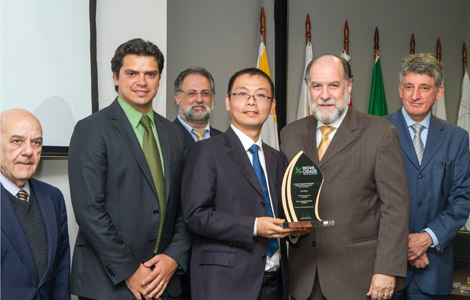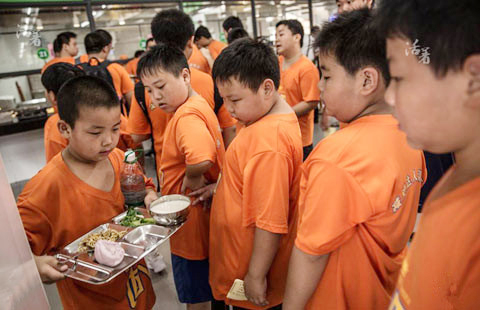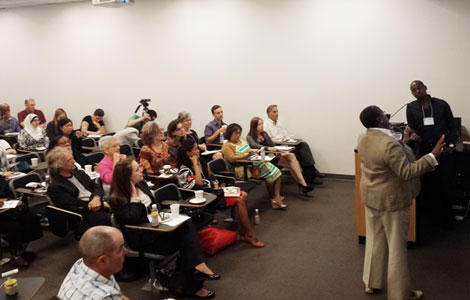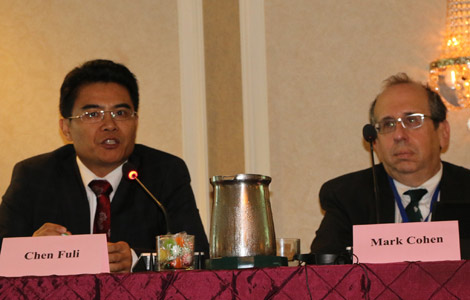China, US step up IPR cooperation
Updated: 2014-09-15 06:36
By CHEN WEIHUA in Washington(China Daily USA)
|
||||||||
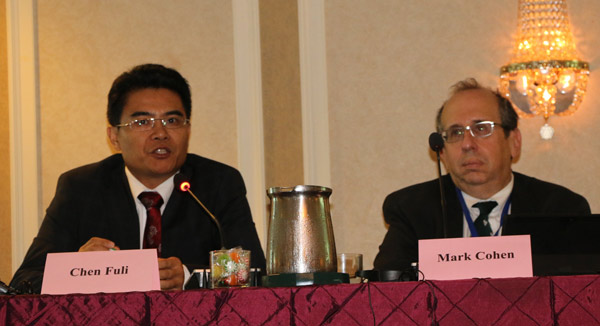 |
|
Chen Fuli (left), the IPR attaché at the Chinese embassy in Washington, speaks at the 2014 China's IPR Overseas Exchange event held at the Holiday Inn Georgetown on Friday. On the right is Mark Cohen, attorney-advisor of the United States Patent and Trade Office.The one day event brought a Chinese delegation comprising of experts from a number of government agencies such as Ministry of Commerce, the Supreme People's Procuratorate, General Administration of Customs, State Administration of Industry and Commerce, State Intellectual Property Office, as well as US participants from US Trade Representative office, US Patent and Trademark Office and representatives from US research institutes and companies such as IMB and P&G. It was the fourth year since the exchange was first launched in 2011. Photo by Chen Weihua/China Daily |
A Chinese government delegation spent a whole day in Washington on Friday to help people better understand the improving intellectual property rights (IPR) protection in China.
The Chinese delegates - from central government departments such as the Ministry of Commerce, the Supreme People's Procuratorate, General Administration of Customs, State Administration of Industry and Commerce and the State Intellectual Property Office - talked about the country's efforts in combating IPR infringement and piracy, enforcement of the legal system, and more specifically, copyright protection, the implementation of the trademark law and the introduction of Geographical Indications (GI), something relatively new in China.
GI refers to a name or sign used on certain products which corresponds to a specific geographic location or origin. Napa Valley in California became in 2012 the first foreign wine region to be granted a GI recognition in China.
The one-day 2014 China's IPR Overseas Exchange, held at the Holiday Inn Georgetown, drew some 80 Chinese and American participants. The US side included people from the US Trade Representative office, US Patent and Trademark Office and representatives from US research institutes and companies such as IMB and Proctor and Gamble (P&G).
It was the fourth year for the event to be held in the US since it was first launched in 2011 to help the outside world better understand China's efforts in IPR protection and seek international cooperation.
"The Chinese government has always put a high emphasis on IPR protection," said Chen Fuli, the IPR attaché at the Chinese embassy in Washington.
He said the government had continued to push forward the legislation of a series of IPR laws and pursue relevant reforms in the judicial sector, citing the revision of the trademark law and copyright law as well as the establishment of IPR courts in cities such as Beijing, Shanghai and Guangzhou.
"With the deepening of the reform, China's IPR framework has become more mature and better conforms to advanced international practices," he said.
Chen noted that IPR has been a key issue in China-US economic and trade relations and China has placed a high priority on strengthening exchange with the US side on the issue.
Mark Cohen, attorney-advisor of the US Patent and Trade Office, expressed appreciation for the efforts and achievements the Chinese government has made in IPR protection in recent years.
Cohen said the US also pays strong attention to exchanges with China on the IPR issue. The intensive and various exchange and cooperative activities underway will help boost the mutual understanding and trust on the IPR issue, he said.
Cohen expressed the US side will continue to work with China and strengthen exchanges through the existing bilateral mechanisms.
In June testimony before the US Senate Foreign Relations Committee, former US ambassador to China Stapleton Roy noted that US companies such as Microsoft have witnessed the progress China has made in IPR protection.
Although Roy said the progress is not enough, he believes the US needs patience and China, unlike some other nations, is earnest about IPR protection because it has the ambition to become an innovation-based economy.
The outcome documents of the sixth meeting of the China-US Strategic and Economic Dialogue held in Beijing in July reaffirmed the two countries' commitment to enhancing exchanges between their judiciaries and other government bodies on IPR matters.
Charles Rivkin, US assistant secretary of state for economic and business affairs, just travelled to the Chinese mainland on Sept 4-6. At a Motion Picture Association movie screening, he highlighted the economic opportunities that exist for both the US and Chinese companies while stressing the importance of IPR protection.
At the Friday meeting in Georgetown, the Chinese officials talked about how recent campaigns have hit hard on websites and people committing IPR violations, such as the Sword Net Action first launched in 2010 by the National Copyright Administration of China and several other government agencies crackdowns on online piracy.
chenweihua@chinadailyusa.com
Most Viewed
Editor's Picks

|

|

|

|

|

|
Today's Top News
Sinopec privatization biggest in Xi's tenure
Beijing to tighten foreign hiring requirements
More CFAs buoy hopes for finance
Hillary Clinton takes a big step toward 2016
US teachers visit China on fellowship
Silk Road, climate change on agenda
Boosting innovation in Latin America
China, LatAm see rosy trade prospect
US Weekly

|

|



